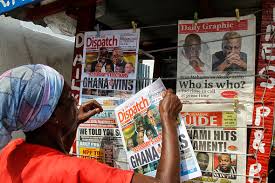The report that Ghana Cocoa Board (COCOBOD) is on track to meet the 50 percent local processing target of cocoa beans produced in the country and the announcement that the Chairperson of the Electoral Commission will not give any evidence at the election petition case are some of the trending stories in the Ghanaian press on Tuesday.
The Graphic reports that the Ghana Cocoa Board (COCOBOD) is on track to meet the 50 percent local processing target of cocoa beans produced in the country, the Chief Executive Officer, Mr. Joseph Boahen Aidoo, has said.
He said the country was currently processing about 40 percent of cocoa beans locally and was, therefore, confident of meeting the 50 per cent target soon.
At the launch of the National Chocolate Week, he said the chocolate week celebrations was part of a bigger drive by the board to promote local processing of cocoa to boost cocoa consumption among Ghanaians.
He said COCOBOD was determined to strengthen its incentive packages to help local processors and artisanal chocolate makers expand their businesses.
“The incentives will ensure that the processors are able to access more beans and produce more chocolates and other cocoa products for the consuming public,” he said.
The government in 2017 announced an ambitious plan to increase cocoa production to one million metric tonnes (MT) as it improves the local processing of the beans to 50 percent.
The country already has seven major cocoa processing firms and with an estimated processing capacity of about 500,000 mt, with the construction of a new 50,000 capacity processing factory in the Western Region currently ongoing.
The newspaper says that witness for the Electoral Commission (EC) in the 2020 election petition (EC), Mrs. Jean Mensa, who is also the Chairperson of the EC, will not give any evidence, lawyers for the EC have indicated to the Supreme Court.
Lead counsel for the EC, Mr. Justin Amenuvor, told the apex court that his client, (EC), which is the first respondent has decided not to adduce any evidence and therefore the court should decide the petition filed by former President John Dramani Mahama on its merit.
He premised his argument on Order 36 (4) sub rule 3 of the High Court (Civil Procedure Rule), C.I 47, which he argued allowed the respondent to decide not to adduce any evidence.
“The case of the first respondent is that we do not wish to adduce any evidence. Our case is closed”, he argued.
Counsel made the submission after the petitioner brought his case to a close following the cross-examination of the third witness for the petitioner, Mr. Robert Joseph Mettle-Nunoo on Monday afternoon, February 8, 2021.
Lawyers for President Nana Addo Dankwa Akufo-Addo, the second respondent also took the same position and submitted that their witness, Mr. Peter Mac Manu, will also not give any evidence.
In response, lead counsel for the petitioner, Mr Tsatsu Tsikata, opposed the stance taken by the EC’s lawyer.
He argued that so far as Mrs Jean Mensa, the Chairperson of the EC had put in a witness statement, and had indicated that she will testify, she had “elected” to give evidence and by the rules of court, she must give the evidence.
The Times says that the Bank of Ghana (BoG) has developed a new Liquidity Assistance Framework (LAF) to provide emergency financial support to solvent Banks, Savings and Loans Companies as well as Finance Houses (BSF) when the need arises.
The LAF move, according to the BoG, was to promote financial stability and minimise moral hazard as well as risks to the BoG’s balance sheet.
The new policy and operational framework, which covers Intraday Liquidity Facility (ILF) and Emergency Liquidity Assistance (ELA), is also to forestall the recent banking crisis, among others, occasioned by poor governance and corporate practices and low liquidity of banks.
A document on the LAF copied to the media in Accra on Friday, said the exercise was in line with the Section 3 of the BoG Act, 2020 (Act 612) as amended by the BoG Amendment Act, 2016 (Act 918).
Under the section, the BoG is mandated to maintain price stability, promote effective and efficient operation of the banking and credit system and contribute to the maintenance of financial stability in Ghana.
The LAF said the new ILF “is to support efficient functioning of the payment and settlement systems and the ELA is to provide liquidity support to eligible and solvent BSF facing temporary liquidity challenges.”
GIK/APA


